
Revista Electronica de LEEME
Scope & Guideline
Showcasing Excellence in Arts Research Since 1998.
Introduction
Aims and Scopes
- Interdisciplinary Approaches to Music Education:
The journal aims to integrate diverse fields such as psychology, technology, and cultural studies into music education, fostering a holistic understanding of how music can be taught and learned. - Innovative Pedagogical Practices:
It explores innovative teaching methods and practices, emphasizing creativity, problem-based learning, and the use of technology in music education. - Cultural and Social Contexts of Music Education:
The journal addresses the impact of cultural diversity and social contexts on music education, examining how these factors influence teaching methodologies and student perceptions. - Research on Teacher Training and Development:
There is a consistent focus on the training and professional development of music educators, assessing how educational programs can better prepare teachers for contemporary challenges. - Impact of Music on Well-being and Learning:
The journal investigates the psychological and social benefits of music education, including its role in emotional development, self-regulation, and community building.
Trending and Emerging
- Technology Integration in Music Education:
There is a notable increase in studies focusing on the use of digital tools and platforms for music education, highlighting the importance of technology in enhancing teaching and learning experiences. - Multicultural and Inclusive Music Education:
Recent papers emphasize the significance of multiculturalism in music education, exploring how diverse musical traditions can be integrated into curricula to foster inclusivity. - Social-Emotional Learning through Music:
The journal has seen a rise in research addressing the role of music in social-emotional learning, investigating how music education can support emotional development and resilience. - Community and Intergenerational Music Projects:
Emerging themes include the exploration of community-based music initiatives and intergenerational projects, which highlight the social impact of music education beyond the classroom. - Critical Pedagogy and Music Education:
There is a growing interest in critical pedagogical approaches within music education, focusing on social justice, equity, and the transformative potential of music as a tool for change.
Declining or Waning
- Traditional Music Education Methods:
There seems to be a decrease in research focusing solely on traditional music education methods, as the journal increasingly embraces innovative and contemporary approaches. - Focus on Western Classical Music:
Papers centered around Western classical music education are becoming less frequent, indicating a shift towards more inclusive and multicultural perspectives in music education. - Single Discipline Studies:
Research that narrowly focuses on music education without interdisciplinary connections is less prevalent, suggesting a move towards more holistic and integrated studies. - Static Curriculum Development:
There is a waning interest in static or unchanging curriculum development in music education, with a greater emphasis now placed on adaptive and responsive teaching practices. - Traditional Assessment Methods:
The journal is seeing fewer studies on conventional assessment methods in music education, signaling a trend towards alternative assessment practices that better capture student learning and creativity.
Similar Journals
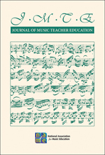
Journal of Music Teacher Education
Navigating the Evolving Landscape of Music Education.The Journal of Music Teacher Education, published by SAGE Publications Inc, is a leading scholarly outlet dedicated to advancing the field of music education. With an ISSN of 1057-0837 and an E-ISSN of 1945-0079, this journal explores a wide array of topics pertinent to music teaching and learning, serving as a vital resource for both researchers and practitioners in the music education community. Since its inception in 1991, it has consistently been positioned among the top-tier journals in both music and education, achieving a notable Q1 ranking in music and Q2 in education as of 2023. With impressive Scopus rankings, placing it in the 89th percentile for music and 47th percentile for education, the journal plays a crucial role in facilitating dialogue and disseminating innovative research aimed at improving music pedagogy. While not an open-access publication, it provides access to invaluable insights and practices that inform both theory and application in music education, making it an essential read for educators, students, and researchers alike, as they navigate the evolving landscape of music teaching. Explore the latest findings and thought-provoking discussions that shape the future of music education in the United States and beyond.

Research Studies in Music Education
Exploring New Horizons in Music Education ResearchResearch Studies in Music Education is a prestigious peer-reviewed journal published by SAGE Publications Ltd, dedicated to advancing the field of music education through innovative research and critical discourse. With an ISSN of 1321-103X and an E-ISSN of 1834-5530, this journal has been a vital resource for academics since its inception in 1993, and continues to serve as a platform for high-quality scholarship aimed at fostering excellence in music education practices worldwide. The journal's impressive Q1 ranking in Music and Q2 in Education for 2023, along with a Scopus rank of #11 out of 180 in the Arts and Humanities category, underscores its significance and influential presence within the academic community. Although it operates under traditional publishing models, readers can expect to encounter a wealth of knowledge that reflects current trends, methodologies, and insights in the realms of music teaching and learning. The journal not only aims to enrich the discourse in music education but also supports researchers, educators, and students in their endeavors to improve musical understanding and pedagogy.

Revista Latinoamericana de Investigacion en Matematica Educativa-RELIME
Empowering Educators Through Open Access ResearchRevista Latinoamericana de Investigacion en Matematica Educativa (RELIME) is a pivotal open access journal dedicated to advancing research in mathematics education across Latin America. Published by the Comité Latinoamericano de Matemática Educativa (CLAME) since 1997, this journal aims to provide a platform for innovative research, theoretical discussions, and methodological advancements in the field. With an ISSN of 1665-2436 and E-ISSN of 2007-6819, RELIME contributes to the scholarly discourse on educational practices and policies, seeking to enhance the quality of mathematics education. Although currently ranked in the fourth quartile in Education by Scopus, with a social sciences education rank of #1153/1543 (25th percentile), the journal's Open Access policy ensures that research is widely available, thereby fostering collaboration among researchers, educators, and policymakers. Located in Mexico, the journal also emphasizes the unique challenges and successes within the Latin American educational context, inviting submissions that explore local, regional, and broader educational paradigms.
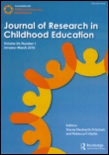
Journal of Research in Childhood Education
Innovating practices for a brighter educational future.The Journal of Research in Childhood Education, published by Routledge Journals, Taylor & Francis Ltd, is a prestigious academic journal that has been at the forefront of childhood education research since its inception in 1986. With an ISSN of 0256-8543 and E-ISSN 2150-2641, this journal serves an essential role in disseminating findings and discussions pertinent to the fields of developmental and educational psychology, as demonstrated by its notable rankings in the 2023 Scopus Ranks, placing it in the 66th percentile of Educational Social Sciences and 49th percentile in Developmental Psychology. With a current Q2 category quartile designation in both Developmental and Educational Psychology and Education, it aims to foster a deeper understanding of the complexities surrounding childhood education practices and policies. Researchers, educators, and students alike will find robust and insightful research that contributes to advancing educational theories and practices, supporting the journal's mission to enhance the overall quality of education for children globally. This journal continues to be a critical resource for individuals passionate about enhancing early childhood education and comprehending the developmental challenges faced by children today.
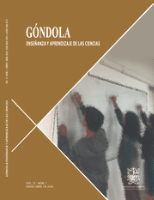
Gondola-Ensenanza y Aprendizaje de las Ciencias
Fostering Global Dialogue in Science Teaching and LearningGondola-Ensenanza y Aprendizaje de las Ciencias is a distinguished academic journal published by the Universidad Francisco José Caldas, Faculty of Science & Education, which has made significant contributions to the fields of science education and didactics since its inception in 2006. With an Open Access model, the journal encourages wide dissemination and engagement with research across international borders, fostering a community of scholars, educators, and students dedicated to innovation in teaching and learning scientific concepts. Although currently lacking an HIndex and specific ranking categories, the journal is committed to upholding high academic standards and disseminating impactful research that informs educational practices. Researchers and educators are invited to explore a diverse array of articles that address contemporary challenges and advancements in science education, thereby enriching pedagogical approaches and enhancing student learning outcomes.

Croatian Journal of Education-Hrvatski Casopis za Odgoj i obrazovanje
Transforming Educational Landscapes with Open Access KnowledgeThe Croatian Journal of Education-Hrvatski Casopis za Odgoj i obrazovanje, published by the FAC TEACHER EDUCATION, serves as a pivotal platform for disseminating research within the realm of educational sciences in Croatia. With an ISSN of 1848-5189 and an E-ISSN of 1848-5197, this journal has emerged as a significant contributor to the academic discourse on education, spanning the years from 2011 to 2024. Acknowledged in the Q4 category of the 2023 Education quartiles and ranking 1230 out of 1543 in the Scopus Social Sciences field, the journal provides a wide-ranging repository of scholarly articles, focusing on teaching methods, educational policy, and pedagogical innovations. It proudly operates under an Open Access framework, making valuable research accessible to a broader audience while supporting the advancement of educational practices. As a resource for researchers, professionals, and students alike, this journal is an essential avenue for fostering dialogue and collaboration in the evolving landscape of education.
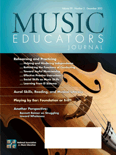
MUSIC EDUCATORS JOURNAL
Championing Innovative Approaches to Music EducationMUSIC EDUCATORS JOURNAL, published by SAGE PUBLICATIONS INC, serves as an essential resource for researchers, educators, and practitioners in the fields of music education and broader educational practices. With its ISSN 0027-4321 and E-ISSN 1945-0087, this prestigious journal has been integral in advancing the discourse surrounding music pedagogy since its inception. Operating without an open access model, it boasts impressive rankings, placing it in the Q1 category for Music and Q2 for Education according to 2023 quartiles, illustrating its significant contribution to these fields. The journal is recognized in Scopus with a rank of #34 out of 180 in Arts and Humanities - Music, further solidifying its reputation as a premier publication. Aimed at enlightening its readership through empirical research, innovative teaching practices, and critical examinations of music education reform, the MUSIC EDUCATORS JOURNAL is an invaluable platform for fostering dialogue and discovery, making it a must-read for all engaged in the music education landscape.

Ensenanza de Las Ciencias
Innovating Teaching Practices for Tomorrow's ScientistsEnsenanza de Las Ciencias is a leading academic journal dedicated to the field of education, with a particular focus on the methodologies and practices involved in teaching sciences. Published by Universitat Autònoma de Barcelona, this journal is on a mission to disseminate innovative research and pedagogical strategies that enhance scientific education. Since adopting an Open Access model in 2010, Ensenanza de Las Ciencias has become increasingly accessible to a global audience, facilitating the exchange of knowledge among researchers, educators, and students. With its ISSN 0212-4521 and E-ISSN 2174-6486, the journal boasts an impressive impact, ranking in the Q2 category for education as of 2023 and securing a respectable 49th percentile ranking in Scopus among Social Sciences - Education publications. The journal's converged years, spanning from 2009 to 2024, highlight its ongoing commitment to advancing educational practices. In an ever-evolving academic landscape, Ensenanza de Las Ciencias plays a crucial role in shaping future educators and fostering a deeper understanding of science education in Spain and beyond.

Revista Contemporanea de Educacao
Advancing Educational Insights for a Brighter TomorrowRevista Contemporanea de Educacao, published by the Universidade Federal do Rio de Janeiro, is a key academic journal dedicated to the field of education, contributing valuable insights since its inception in 2006. With its Open Access model, the journal ensures that cutting-edge research and critical discussions about contemporary educational practices are freely available to scholars, educators, and policy-makers alike. Operating from the vibrant academic environment of Rio de Janeiro, the journal aims to foster dialogue and innovation within various educational contexts, promoting interdisciplinary approaches and addressing urgent challenges faced in education systems today. By encouraging submissions on a range of topics, the Revista Contemporanea de Educacao serves as a vital platform for advancing understanding and practice in education, making it an essential resource for researchers, professionals, and students committed to enhancing learning outcomes and educational equity in Brazil and beyond.
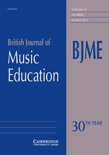
British Journal of Music Education
Cultivating a Global Community of Music EducatorsBritish Journal of Music Education is a prestigious academic publication dedicated to advancing the field of music education. Published by Cambridge University Press, it benefits from a notable impact factor that positions it in the Q2 category in Education and the Q1 category in Music as of 2023. This journal serves as a vital platform for researchers, educators, and students alike, focusing on innovative research, pedagogical studies, and theoretical discussions that shape the practice of music education globally. Since its inception in 1984, the journal has contributed significantly to the understanding of music pedagogy and continues to be relevant and influential, currently spanning the years from 1984 to 1998 and 2007 to 2024. With impressive rankings, including rank #16/180 in Arts and Humanities (Music) and rank #669/1543 in Social Sciences (Education) on Scopus, it highlights the journal's commitment to scholarly excellence. Though it does not currently offer open access, its contributions are an essential resource for anyone involved in the education landscape of music.